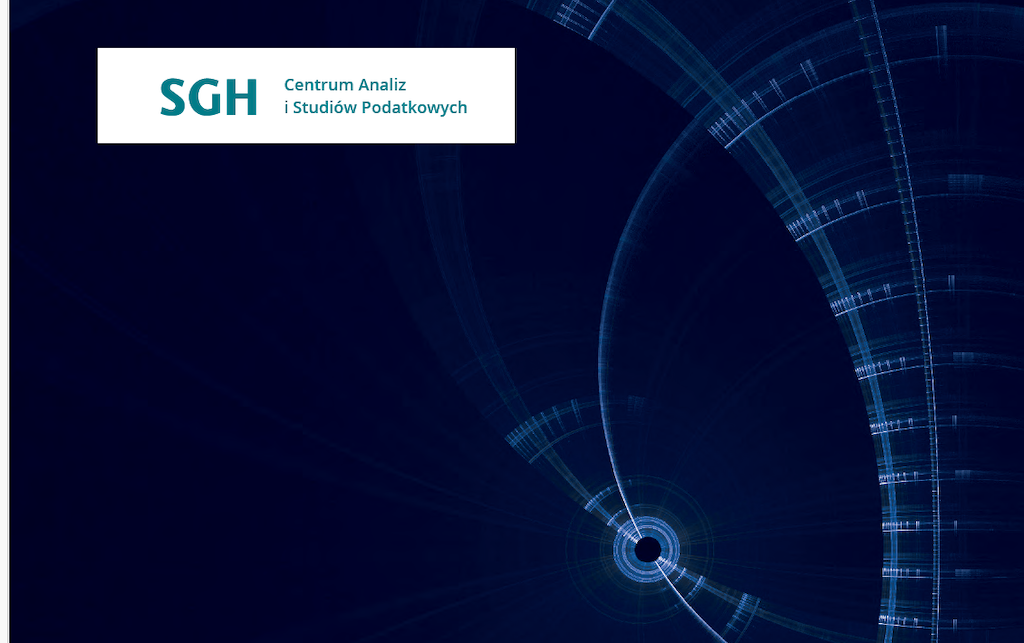Konferencje i seminaria

II TAX WEBINAR CASP SGH (2022)
The Centre for Analysis and Studies of Taxation (CASP) at the Warsaw School of Economics (SGH) with patronage of IFA Poland held tax webinar: “PERMANENT ESTABLISHMENT - IS IT STILL A TOPIC IN CONSIDERATION OF TAX RISK”.
The webinar was on 27 September 2022 and was focused on the overview of the current situation concerning permanent establishment.
- remote working culture – are the tax departments to blame for restraining new normality?
- attribution of profits to PE – is everything clear?
- why PE is not controlled company for tax purposes?
We welcomed a variety of thought-provoking panelists:
- Ms. Gabriela Capristano Cardoso, Analyst in the Transfer Pricing Unit (CTPA), OECD
- Ms. Maja Kowalewska - The Deputy Director, Income Tax Department, Ministry of Finance, Poland
- Ms. Patrycja Brzostowska - Director Tax at Gorillas Technologies Group
- Mr. Stefaan De Baets - Senior Counsel in transfer pricing, International Tax Team, PwC, Belgium
- Mr. Bartłomiej Cedro - Regional Tax Counsel & South Eastern Europe at Nestlé
- Mr. Krzysztof Łukosz - Associate Partner, Transfer Pricing & Operating Model Effectiveness, EY, the Netherlands
Moderator: dr Monika Laskowska, CASP Warsaw School of Economic
Country Reporter: Wojciech Niedźwiedzki, CASP Warsaw School of Economics
Opening and closing remarks:
dr hab. Dominik J. Gajewski, prof. SGH, CASP Warsaw School of Economics
dr Monika Laskowska, CASP Warsaw School of Economics
THE WEBINAR WAS FREE AND WAS CONDUCTED IN ENGLISH
HOME OFFICE
The panelists focused on the overview of the current situation concerning permanent establishment. One of the topics we picked was potential of creating PE by home-office.
In January 2022, Polish court confirmed[1]that home-office may create PE. The main thesis from that decision can be summarized as follows:
- home-office might create fixed place of business provided that:
- home-office employees are hired on the basis of employment contract (with possibility to extend it to open-ended contracts) for the purpose of preserving continuous activity, it does not have intermittent nature
- employees will be provided with necessary equipment such as computer/laptop which will be permanently connected with employer’s server
- enterprise has required the individuals to use that location without providing employees with space in the office
- home office is used on a continuous basis for carrying on business activities
and thus it can be considered as being at the disposal of the enterprise.
- home-office might be of permanent nature if:
- employees are hired based on the employment contracts that per se reveal willingness for long-term cooperation,
- it is expected that the employment contracts aim to become open-ended contracts,
- the manner of organizing the place of business suggest its permanent nature,
- in-depth analyses of facts and circumstances are required to determine whether economic activity performed in home-office might be considered of auxiliary or preparatory nature:
- in discussed case – the fragmented activity such as operational back-office, financial back-office and pure data analyses might be considered as of auxiliary or preparatory nature.
[1] Court decision from 31 January 2022, by WSA in Gliwice, sygn. akt I SA/Gl 1340/21.
ATTRIBUTION OF PROFITS TO PE
We also discussed:
- attribution of profits to PE – is everything clear or is it still a challenge?
- why PE is not controlled company for tax purposes?
In the case there is double tax treaty (DTT), the assumptions is that PE profit attribution should follow the applicable article in the tax treaty. This raises the question of which version of the Commentary to the OECD MTC should be applied, and whether the OECD PE Report (introducing Authorised OECD approach) should be applied.
The triggering points for staring this discussion is Polish context where:
- in 2022 ( 12-years after new wording of art.7 on attribution of profits to PE was introduced to OECD MC), Poland ratified its first DTT with the Netherlands that includes such new wording;
- simultanously, since 2019, Poland has equalized in domestic law the status of relations between PE and its head-office with relations between associate companies, while:
- 99 % of Polish DTT has old wording of art. 7,
- there are no specific regulations on how to attribute functions, risks and assets including capital, no reservations on diversifying PE and controlled company with respect to: free capital, preferred method of allocating capital, preferred approach on interest deductibility, etc.
In such conditions, to prefered way to deal with uncertainty is to avoid situations where the PE could be recognized.However, there are still plenty of business situations where such solution is impossible.
We took a look on approach taken in the Netherlands and Belgium on attribution of profits to PE. The general view was given from OECD perspective and business.
Learn more about our panelists.



